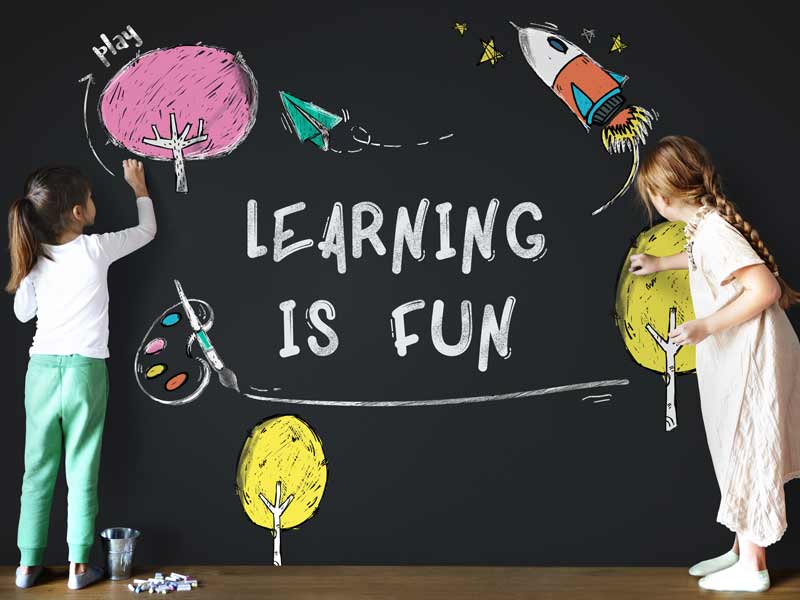Looking at activities through life stages clearly makes a distinction between playing, learning, and working. Childhood is dominated by playing, and playing also prepares for and teaches about certain tasks, as well as work activities.
During schooling, the dominant activity is learning, with playing still included, and gradually young people are increasingly involved in work activities – from cleaning their room to occasional jobs that supplement their pocket money. When education is over, work
becomes the dominant activity and this is when it becomes very important for the weekly plan – if daily basis is not an option – to include play (sports or other types of entertainment), as well as willingness for further learning.

The start of professional life brings one of the most important crossroads in life, which is serious acceptance of responsibility, without relying on (most often parental) support and assistance. Common are the regretful statements that the time of being relaxed and carefree has passed forever and that more and more complicated tasks are ahead.
Playful and carefree
The first thing associated with childhood is play, and the second – most often – being carefree. There is someone who takes care of everything, and the sense of protection promotes imagination and the feeling that obstacles can be overcome, failures can be turned into successes, skills can be mastered, and unknown can be learned. In play we’re all equal and we have opportunities to develop and win and most certainly the possibility of a better and more successful tomorrow. Play is associated with the beginning, duration, possibility of change, and that’s why it’s beneficial at any age and as a companion of all life activities, although not as a dominant one.
In every man there is at least a small hidden piece of Peter Pan, while every woman has a mischievous Pippi Longstocking inside, both waiting for the moment to make life more joyful. This does not mean the syndromes of those who want to never grow up, but instead the valuable capacity to bring a dimension of imagination into everyday life, which becomes more entrapped than any other potential in the mature age.
The free-child ego state
We all carry a childlike piece inside ourselves, which experts termed free-child ego state, which determines the capacity for freedom, spontaneity, genuineness, pro-activity, and creativity. While some people have an overbalanced free child in themselves – keeping the huffiness, willingness to (unnecessary) risks, and other socially unacceptable qualities – others, which we call too serious or over-adjusted, should awaken and foster the free child inside. Due to all this, in the last decades, the principles of play have been integrated into many educational programs, team building events, and other activities that reinforce personal and team competencies.
It has long been proven that the principles of play increase learning capacities, everyday reception of new information, and even suggestions; they develop motivational factors
and stimulate productivity. The liberation from sometimes rigid rules of the system in which
professional life takes place – from the dress code to all elements of behavior and communication – including games releases spontaneity and creativity, encourages resourcefulness and expression (improvement) of skills and potentials. It is precisely the skills and potentials that are sometimes considered to have no place in the business context those that can reveal much more intense true capacities of the person, as well as the ways in which they will can be realized, individually or in the team.
Play because…
Sensitive topics, as well as topics that in a way touch upon issues of discrimination (practice often shows desirability of male/female roles, but many other topics are also present), can easily be overcome through the principles of games. Starting from the basic principles
of the team’s strengths that are based, among other things, on (professional but also basic human) trust, all the way to achieving high productivity levels in work, as well as gratification and satisfaction after the accomplished, all of the steps can be accompanied by certain “games”. Some systems have their weekly schedules times allocated to activities of this type on a weekly basis or less, while others apply day-long, week-long, or days-long stays outside the place of work/living, in order to meet all the specific requirements for raising the learning effectiveness through or during games.
This is one of the most important reasons why seminars are held outside working hours in environments that are very much different from typical business surroundings. In the general hustle and bustle of life, and especially when viewed from the career aspect, sometimes it can be heard that such activities are a waste of time and money for the company. Although the negative view of “learning through play” is becoming less common, only those who have not yet tried this system of employee functioning have doubts. It is very important to explain what certain activities are for, what they bring, and what benefits they provide – both personally and at the whole organization level.
The circumstance that employees who more or less work together intensely in fact don’t know each other can take a toll in productivity, and n turn the profits of the company. Ex-cathedra lectures or hours-long meetings do not produce the expected results, and this circumstance has long been recognized both in the world and in our country. Respecting (scientifically proven) potentials and capacities – psycho-physiological and intellectual – and
keeping attention on the desired content requires much more than words spoken by a lecturer or an authority figure. Interactivity has become imperative for any kind of productivity. Starting from a borrowed paper clip, through brainstorming, to focusing on raising the professional and personal quality of life the benefits of interaction range throughout hierarchical levels (both vertical-authority figure/employee and horizontal –
employee/employee).
Getting to know the people one works with (associates/subordinates/ superiors) turns out to be the basis for success. That is why many of the activities that accompany learning and that we know under the term games include the so-called warm-up games to “defrost” the atmosphere – the so-called icebreakers, for establishing cohesion and more powerful connecting of all employees. The results are often fascinating for all participants, both for those who were just curious and for those who had a positive or even negative attitude. A special mood that is created during learning through games – whether we’re talking about a specific professional seminar or another type of learning such as the principles of communication or even just relaxation – facilitates a level of learning that is very high. Participants learn something that is crucial to them, as well as to those in whose company
they spend more than a third of their day, which is the most common time we spend working.
Motivation and play
It should also be noted that motivational factors play a very important role and that they can be very diverse. Some are driven by existential or financial motivators, others are motivated by a drive for achievement. Regardless of the fact that motives are subjective, everyone has them, which, again, is revealed in interaction most easily. Despite the complexity of business, satisfaction with oneself and the business environment very significantly affects productivity, and also most certainly health. In light of this, the activities in question – although they represent an expense for the company – are in fact the safest investment that brings success and in turn profits.
Dragana Deh, Psychology MSc,
Systemic Therapist, Life Coach










































 Srpski
Srpski English
English